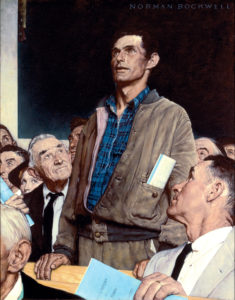
Norman Rockwell (1894-1978), “Freedom of Speech.” The Saturday Evening Post, February 20, 1943.
BY ED FELIEN
Funding for neighborhood organizations has come mostly from the increased property taxes on downtown development. In 1989 the city gave developers a huge tax break to encourage development. Tax Increment Financing meant they would only have to pay property taxes on the value of the buildings they were tearing down, and the property taxes on the new buildings would begin well after construction was finished. Longfellow resident and former City Council Member Tony Scallon proposed that the increase in property tax revenue go to support a Neighborhood Revitalization Program that would fund neighborhood organizations for 20 years.
That was 1989. Twenty years later the city doesn’t want to continue that support without serious strings attached.
Neighborhood organizations are a pain in the butt for council members and the mayor. They always act like they know more about their neighborhood than elected officials and city staff. Rybak wanted to end them when he was mayor, and now the 2020 Plan wants to starve them to death.
The Longfellow Community Council has responded by writing to Council Members Andrew Johnson, Alondra Cano and Cam Gordon:
“The Longfellow Community Council (LCC) Board of Directors has reviewed the draft Neighborhoods 2020 Recommendations and we are requesting that you do not approve them in their current form. Instead, we ask that you continue funding Neighborhood Organizations (NOs) at the current level and follow existing CPP program guidelines until a revised plan can be created through intentional coordination with existing Minneapolis NOs. In doing so, you would be honoring the commitment made by the Minneapolis City Council when adopting the International Association for Public Participation’s (IAP2) Spectrum of Community Participation, which emphasizes ‘partnering with the public in each aspect of the decision, including the development of alternatives and the identification of the preferred solution.’
“The Neighborhood system serves as a connective tissue between residents, city staff and elected officials, while also managing the needs, priorities and challenges faced by Minneapolis neighborhoods.
“The proposed Neighborhoods 2020 recommendations fail to recognize neighborhood organizations’ historic commitment to community engagement, their unique ability to develop close relationships with residents and businesses, and to bring people together to strengthen our communities. In their current state, the overarching recommendations will disable our ability to continue to do this effectively.”
The Longfellow Community Council will be hosting a community meeting Tuesday, March 19, from 6:30 p.m. to 8:30 at Longfellow Park, 3435 36th Ave., to discuss the 2020 Plan.






















